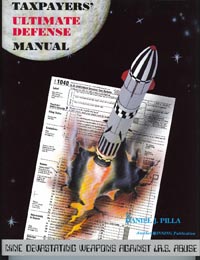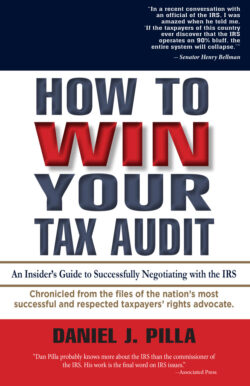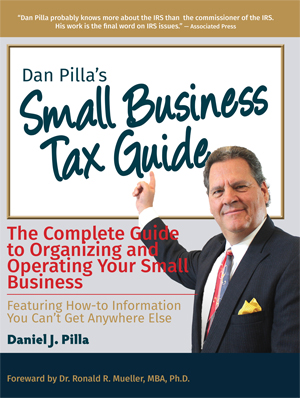Solving 29 of America’s Most Common IRS Problems
Part V – Audit Problems (Problems 14-20)
One of the most stressful aspects of dealing with the IRS is the tax audit. One of the many polls and surveys conducted by a national news bureau showed that the overwhelming majority of adults would rather undergo a root canal than endure a tax audit. In the IRS’s own surveys of citizens, it found that one of the top ten problems people have with the IRS is “fear of audits and documentation needed.” These results are not surprising, given the fact that the average face-to-face audit nets the IRS over $4,200 in additional tax and penalties. After adding interest, the bill doubles.
The bad news is that the IRS’s audit results are wrong a good share of the time. Historically, I have claimed those results are wrong up to 50 percent of the time. However, General Accounting Office (now the Government Accountability Office) studies of the IRS’s audit and appeals data show the results are wrong as much as 60 to 90 percent of the time, depending upon the issue. In my testimony to the Senate Finance Committee during its hearings on IRS abuse, I documented nine specific ways tax auditors take unfair advantage of people to get more money than they owe. In short, auditors use bluff and intimidation, misinformation and disinformation and in many cases, they simply lie to achieve increased tax assessments.
Unfortunately, the vast majority of those who undergo audits end up paying all or part of these improper assessments because they do not understand how to appeal the results or do not understand they have the right to appeal. This confusion leads to greatly escalated costs and enforcement hassles, both for the IRS and citizens. Indeed, according to the Taxpayer Advocate’s Annual Report to Congress, often ranks improper audit results as number as the number one reason people seek help from the TA.
Face it: audits and auditors are intimidating by design. But audits do not have to be costly–if you understand your rights.
Problem 14 Missing receipts to prove deductions.
Problem 15 The IRS claims I earned income I did not report.
Problem 16 The IRS said my business was really a hobby — Disallowed business expense deduction.
Problem 17 The IRS’s audit results are wrong but the auditor demands I sign the report and pay.
Problem 18 I went through appeals but the IRS still says I owe.
Problem 19 I did not realize I could appeal an audit decision or believed it was too expensive.
Problem 20 I already paid taxes I do not owe because I did not understand my appeal rights.
Problem 14 – MISSING RECEIPTS TO PROVE DEDUCTIONS.
CONSEQUENCE: You fail to report all deductions on your return or, if audited, IRS disallows deductions to which you are otherwise entitled. In either case, your tax bill goes up and in the latter situation, you may face penalties and interest.
SOLUTION: Use an affidavit to prove the deductions.
Read more
Lack of documentation or inadequate documentation is the number one reason why the IRS disallows deductions for individual tax return filers. However, in most cases, the IRS is wrong but people do not know it. People are told they cannot claim a deduction unless they have some kind of paper to back it up. Even when they do have paper, such as a canceled check or receipt, the IRS often maintains that such is “not good enough.”
For that reason, it is critical to understand that your oral testimony–that is, your “word”–can be and often is legally sufficient to prove a deduction. When you back up your claims for deductions with your own written statements, signed under penalty of perjury, those statements take the form of testimony, just as if given in a court of law. Such a statement is known as an affidavit. As long as the testimony in the affidavit is plausible, credible and uncontroverted, it must be accepted. By presenting your testimony in writing, you become capable of claiming and proving deductions you are entitled to claim but for which you have no receipt or canceled check.
My book, How To Win Your Tax Audit, is our audit-defense handbook. It guides you step-by-step through the audit process. In chapter six, I illustrate exactly what kind of records are necessary to prove the correctness of your tax return and how to use affidavits to verify deductions when records are lost or otherwise unavailable.
Problem 15 – THE IRS CLAIMS I EARNED INCOME I DID NOT REPORT.
CONSEQUENCE: Unless you can “prove a negative,” you end up paying taxes, penalties and interest on income you never received.
SOLUTION: Use affidavits to provide affirmative proof of your income.
Read more
The biggest problem facing the average citizen in the context of the tax audit is not the disallowance of deductions. Rather, it is the assessment of tax based upon “unreported income.” The IRS has mounted an elaborate campaign against the average citizen designed and intended to root out the so-called “underground economy.” The sad truth is the IRS believes you–Mr. and Mrs. Average American–are cheating by hiding your income. The IRS’s claims of unreported income have reached a crisis level. In its 1997 Annual Report to Congress, the Taxpayer Advocate admitted that such false reports were the eleventh most serious problem faced by citizens, according to a national survey of tax professionals.
That is why it is critical to understand that you must establish affirmative proof that the income claimed on your tax return is correct and complete. Do that by providing both bank records and employment records–such as pay stubs–that tie to the income reported on the return. If your employment records show, say, $35,000 of salary and your bank deposits show the same, you are in good shape if you claimed $35,000 of income on the tax return. However, if your bank records show $55,000 of deposits and you reported $35,000 of income, you have some explaining to do. That is not to say that you may not have some non-taxable source of revenue, but you must prove it.
An affidavit declaring that you reported all income on your return is essential to defeat the potential unreported income claim. This sworn statement, backed up by records, helps to defeat the IRS’s claim that you earned more than you reported. Chapters eight, nine and ten of How To Win Your Tax Audit, take you through this process, giving specific examples of how to combine your own records with affidavits in order to win the issue. Do not wait until you are attacked. Read that material now so you can prepare properly. You will be miles ahead of the game if you follow the simple steps outlined in the book before you come under audit.
Read more
One problem faced by small business owners who do not realize a profit their first few years is the risk the IRS will dub them a hobby, not a business. The significance is that expenses are deductible only if they are incurred for the purposes of earning income. Expenses incurred in connection with pleasure, recreation or hobby activity are not deductible. When a business does not earn a profit, the IRS assumes the owner never intended to earn a profit and hence, calls the activity a hobby, thus disallowing all the deductions.
While the common perception is that one must earn a profit in three of the first five years of doing business, there is no such rule. The tax code merely states that if you do not earn a profit in three of five consecutive years, you must prove that your purpose and intent is to make a profit. Otherwise, your business deductions are not allowed. So the key is to prove you have the good faith intent to make a profit. As long as you show the specific intent to earn profit, the fact that you have lost money does not render your business as a hobby, even if you lost money for ten consecutive years.
The key to success in this dispute is to show the objective steps you take to earn profit. This includes advertising, implementing specific strategies, cutting expenses, attending seminars, using professional managers or consultants, etc. In fact, the IRS has made a list of some of the key elements that speak to this question which I thoroughly discuss in my book, Dan Pilla’s Small Business Tax Guide. One section of that book deals exclusively with this important question, illustrating exactly how to deal with the claim that you are not in business for profit.
Read more
You do not have to accept audit findings that are inaccurate. In fact, I insist that you do not. You have the absolute right to appeal and when you do, the IRS’s own statistics show that citizens win most of the time. The appeals process is simple and inexpensive. It involves the process of drafting what is called a protest letter. It explains what aspects of the audit you disagree with and why. It asks for a conference before the IRS’s Appeals Office.
The Appeals Office is designed to review contested cases and reach a settlement. The written job description of the Appeals Office is to negotiate a settlement with the citizen. The vast majority of cases before the Appeals Office reach a favorable settlement. That is because Appeals Officers are trained to reach settlements based upon the facts and the law and not upon the idea of just getting the money.
Chapter eleven of How To Win Your Tax Audit walks the reader step-by-step through the process of writing a protest letter and executing the appeal. Then, in chapters thirteen and fourteen, I give specific tips for negotiating a favorable settlement.
Problem 18 – I WENT THROUGH APPEALS BUT THE IRS STILL SAYS I OWE.
CONSEQUENCE: All or part of the audit bill is still intact.
SOLUTION: File a Tax Court petition.
Read more
When a favorable conclusion cannot be reached through the appeals process, you have the right to take your case to the United States Tax Court. The role of the Tax Court is limited to reviewing IRS determinations and deciding whether they are correct. In Tax Court, you have a second opportunity to negotiate both with the Appeals Office and with the IRS’s attorneys, known as Area Counsel.
The process is remarkably simple and inexpensive. You can file a petition in the Tax Court for just $60. When you do, the case is assigned to Appeals for settlement negotiations. If you cannot reach an agreement with Appeals, the case is handed to the attorneys where you get another bite of the apple. The procedures for filing a Tax Court petition, including how to draft the petition and how to work with both Appeals and District Counsel, are discussed in chapter four, Taxpayers’ Ultimate Defense Manual.
Problem 19 – I DID NOT REALIZE I COULD APPEAL AN AUDIT DECISION OR BELIEVED IT WAS TOO EXPENSIVE.
As a result, my time to appeal expired and the IRS is collecting even though I really do not owe the tax.
CONSEQUENCE: The IRS collects money you do not owe.
SOLUTION: Request an audit reconsideration.
Read more
As I mentioned in the introductory remarks to this section, the number one reason people seek help from the Taxpayer Advocate is for this very reason. People are bluffed or intimidated into accepting audit results they know are wrong and when the collection process begins, they cry out for help. This problem forced the IRS to implement formal audit reconsideration procedures.
The audit reconsideration is the process by which the IRS opens a closed audit case to reconsider evidence it overlooked in the first audit. Under the new procedures, when a citizen complains to a tax collector that his assessment is in error, the collector is required to immediately stop collection and refer the case for reconsideration. But you do not have to wait for a tax collector to get in your face before making the request. You can do it at any time.
Make the request with a letter directed to the Chief of the Examination function in your area. Explain the reasons why the audit is wrong and list the specific evidence you have to prove your case. Explain why the evidence was either unavailable or not considered by the tax auditor. Provide copies (never originals) of your evidence at the time of making the request. Your case will be assigned for re-examination at which time you have the opportunity to present your evidence and arguments. The audit reconsideration is discussed in detail in chapter eleven of the book, How To Win Your Tax Audit.
Problem 20 – I ALREADY PAID TAXES I DO NOT OWE BECAUSE I DID NOT UNDERSTAND MY APPEAL RIGHTS.
CONSEQUENCE: You are deprived of your property.
SOLUTION: Make a claim for refund.
Read more
Millions of citizens fall into this category because they do not understand their rights or are bluffed out of using them. However, the tax code gives you the right to make a claim for refund of any tax, penalty or interest payment, if you make the claim within two years of payment.
Mail your claim for refund to the service center where you file your tax return. In the claim, list the year in question, the amount in question and explain in detail why you believe it constitutes an overpayment the IRS must return to you. Provide a specific calculation showing the overpayment and document the date you made it. Any and all reasons why you should receive the refund must be stated in your claim. If the IRS grants the claim for refund, you will get your money back–with interest. Chapter six of the book, Taxpayers’ Ultimate Defense Manual, takes you through the process of drafting and filing the claim, as well as the rights to argue your case and appeal an adverse decision.
Back to 29 Problems Packages Back to Top
Solutions – Book Packages
Package 1
IRS Abuse Prevention Package $59
Helps solve problems #1, 2, 8, 12, 14, 15, 16, 17, 18, 19
Includes:
– Small Business Tax Guide
– How to Win Your Tax Audit
Package 2
Tax Problem Resolution Package $75
3 Best Sellers
Helps to solve problems listed in package 1, plus: #1, 5, 6-8, 10-17, 19, 22-26, 28
Includes:
– How to Get Tax Amnesty
– The IRS Problem Solver
– How to Win Your Tax Audit
IRS Defense Library $249
Helps to solve problems listed in package 2, plus: #9, 18, 21, 27, 29
Includes:
– All of Dan’s Current Books
– One year of Pilla Talks Taxes
Dan’s electronic newsletter
Back to 29 Problems Packages Back to Top
Packages qualify for one free 15 minute phone consult with Dan…$75 value



